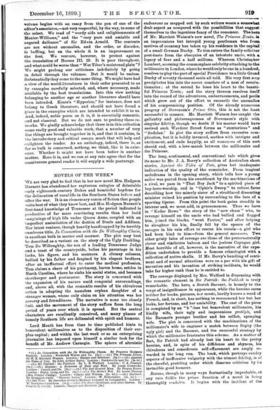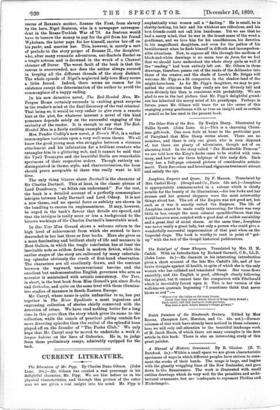NOVELS OF THE WEEK.*
NTH are very glad to find that in her new novel Mrs. Hodgson Burnett has abandoned her rapturous eulogies of delectable -early eighteenth-century Dukes and homicidal hoydens for the delineation of rural life in the Southern States befcre and -after the war. It is an elementary canon of fiction that people write best of what they know beet, and Mrs. Hodgson Burnett's first-hand knowledge of Tennessee at the period indicated is productive of far more convincing results than her lurid Imaginings of high life under Queen Anne, coupled with an imperfect assimilation of the diction of Steele and Addison. Her latest venture, though heavily handicapped by its terribly enimbrous title, In Connection with the De Willoughby Claim, is excellent both in matter and manner. The plot may beat be described as a variant on the story of the Ugly Duckling. 'Tom De Willoughby, the son of a leading Tennessee Judge and a toast of the countryside, belies his parentage in his looks, his figure, and his manners. A clumsy colossus, bullied by his father and despised by his elegant brothers, after an ineffectual effort to enter the medical profession, Tom claims a share of his patrimony, leaves home, settles in North Carolina, where he sinks his social status, and becomes :storekeeper and postmaster. The story is concerned with the expansion of his nature amid congenial surroundings, and, above all, with the romantic results of his chivalrous action in adopting the nameless orphan daughter of a stranger woman, whose only claim on his attention was her poverty and friendliness. The narrative is none too closely Init, and the movement of the story suffers from the long period of years over which it is spread. But the central 'characters are excellently conceived, and many phases of homely Southern life are delineated with spirit and humour.
Lord Meath has from time to time published hints to benevolent millionaires as to the disposition of their sur- plus capital; and within the last week or so an enterprising journalist has imposed upon himself a similar task for the benefit of Mr. Andrew Carnegie. The sphere of altruistic
(1.) In Connection with the De Willoughby Claim. By Frances Hodgson Burnett. London : Frederick Warne and Co. [6s.]—(2.) The Princess Xenia. By H. B. Marriott Watson. London : Harper and Brothers. [6&]—(3.) Against the Tides of Fate. By John Arthur Barry. London : Duckworth and Co. (3e. ed.) ---(4.) Sir Patrick : the Puddock. By L. B. Walford. London : C. A. Pearson. fes.]—(5.) Ronan: a Romance of East and West. By Louis CruswIcke. London : Cassell and Co. (Gs.)—(6.) The Red-Headed Man. By Fergus Hume. London : Digby, Long, and Co. [6s.]—(7.) The Siren's Web. By Annie Thomas ( Mts. render Cu clip). London : Chatto and Windus. (3s. 6d.]—(8.) Dartnell. By Benjaniln,Swift. "Pioneer Series." London : W. Heinemann. [2e. 6d.]- ( 9.) One Year. By Dorothea Gerard (Madame Longard de Longgarde). London : W. Blackwood and Sons. [60.]—(10.) The litter Syndicate, and other Stories. By Charles B. Carryl. London ; Harper and Brothers [2e.] endeavour as mapped out by such writers wears a somewhat drab aspect as compared with the possibilities that suggest themselves to the ingenious fancy of the romancer. The hero of Mr. Marriott Watson's new novel, The Princess Xenia. is an impecunious but intrepid young gentleman who from motives of economy has taken up his residence in the capita/ of a small German Duchy. To him enters the family solicitor post-haste from the obsequies of an intestate uncle, with a legacy of four and a half millions. Whereon Christopher Lambert, scorning the commonplace celebrity attaching to the millionaire in London, where he would only beone in a hundred, resolves to play the part of special Providence to a little Grand Duchy of seventy thousand souls all told. His very first step precipitates him into the secret conclave of a nest of revolu- tionaries ; at the second he loses his heart to the beauti- ful Princess Xenia ; and the story thereon resolves itself into the record of the adventures, embarrassments, and perils which grow out of the effort to reconcile the anomalies of his compromising position. Of the already numerous progeny of Stevenson's Prince Otto, this is not the least successful in manner. Mr. Marriott Watson has caught the gallantry and picturesqueness of Stevenson's style with singular fidelity, though we doubt if his master would have revived such Wardour Street forms as " stentorious " and " dmdalan." In plot the story suffers from excessive com- plication, but it is boldly invented, seethes with intrigue and excitement, and ends happily, as all romances of this sort should end, with a love-match between the millionaire and the Princess.
The long, sentimental, and conventional tale which gives its name to Mr. J. A. Barry's collection of Australian short stories, Against the Tides of Fate, gives but inadequate indication of the quality of the remainder. From tragical melodrama in the opening story, which tells how a young sailor was parted from his sweetheart by the machinations of a rival, we pass in " That Boy Jack " to a spirited piece of boy-hero-worship, and in " Ophir's Sweep" to robust farce describing how the miserly sister of a straitlaced dissenting minister ruined his position by succumbing to the lure of a sporting tipster. From this point the book gains steadily in interest and, we must add, in gruesomeness. Thus we have in " Kedar Rowe " the story of the " new chum " who, to revenge himself on the uncle who had bullied and flogged him, joined the blacks, "went Fantee," and after helping to slaughter his kin, finally fell by the spears of the savages in his vain effort to rescue his cousin—a girl who had been kind to him—from the general massacre. Two other grisly tales of revenge are those of the preternaturally clever and vindictive baboon and the jealous Cayugan girl. Most horrible of all, however, is the narrative of the expe- dition undertaken to provide a famous ethnologist with a collection of native skulls. If Mr. Barry's handling of senti- ment and of normal situations were on a par with his gift of narration and his invention of striking incidents, he would take far higher rank than he is entitled to.
The courage displayed by Mrs. Walford in dispensing with the romantic element in Sir Patrick : the Paddock is truly remarkable. The hero, a Scotch Baronet, is homely to the verge of insignificance in appearance, while the heroine cares neither for books, pictures, nor music, hardly knows a word of French, and, in short, has nothing to recommend her but her looks, her fortune, and her amiability. The cast of the piece is completed by an " h "-less but benevolent millionaire, his kindly wife, their ugly and impecunious protegee, and the Baronet's younger brother and his selfish, sponging wife. The plot is concerned with the machinations of the millionaire's wife to engineer a match between Sophy (the ugly girl) and the Baronet, and the successful strategy by which the millionaire frustrates this scheme. As a matter of fact, Sir Patrick had already lost his heart to the pretty heroine, and, in spite of his diffidence and shyness, his chivalrous and considerate self-effacement are amply re- warded in the long run. The book, which portrays sundry aspects of inoffensive vulgarity with the utmost fidelity, is of the cheerful, prattling order which disarms criticism by its invincible good humour.
Roxane, though in many ways fantastically improbable, at any rate fulfils the prime function of a novel in being thoroughly readable. It begins with the incident of the rescue of Roxane's mother, Roxane the First, from slavery by the hero, Nigel Seatoun, who is a newspaper correspon- dent in the Russo-Turkish War of '78. As Seatoun would have to borrow the money to pay for the girl from his friend Wykeham, the latter pays for her himself, carries her off on his yacht, and marries her. This, however, is merely a sort of prelude to the story proper of Roxane IL, the daughter. who, after many romantic adventures, out-Rachels Rachel as a tragic actress, and is drowned in the wreck of a Channel steamer off Dover. The worst fault of the book is that the canvas is overcrowded, nor does the author always succeed in keeping all the different threads of the story distinct. The whole episode of Nigel's neglected lady-love Mary seems a little forced. Indeed, there seems no reason for its existence except the determination of the author to avoid the commonplace of a happy ending.
In his new detective novel, The Red-Headed Alan, Mr. Fergus Hume certainly succeeds in exciting great surprise in the reader's mind at the final discovery of the real criminal. That being so, it would be very unfair to give even a remote hint at the plot, for whatever interest a novel of this kind possesses depends solely on the successful engaging of the curiosity of the reader. It is enough to say that The Red- Headed Man is a fairly exciting example of its class.
Mrs. Pender Cudlip's new novel, A Siren's Web, is a rather commonplace variation upon a very well-worn theme. We all know the good young man who struggles between a virtuous attachment and his infatuation for a brilliant creature who entangles him in a glittering web, and it cannot be said that Sir Vyell Tremayne and the beautiful Stella are remarkable specimens of their respective orders. Though entirely un- distinguished in theme, style, and characterisation, the book should prove acceptable to those who really want to kill time.
The only thing bizarre about Dartnell is the character of Sir Charles Dartnell. This at least, in the classic phrase of
Lord Dundreary, "no fellah can understand." For the rest, the book is a detailed account of a perfectly commonplace intrigue between Lady Dartnell and Lord Odney. It is not a new theme, and no special force or subtlety are shown in the handling to excuse its unpleasantness. It may, however, be urged in the book's favour that details are spared, and that the intrigue is really more or lees a background to the bizarre workings of Sir Charles Dartnell's inscrutable mind.
In One Year Miss Gerard shows a welcome return to the high level of achievement from which she seemed to have descended in her last three or four books. Here she gives us a most fascinating and brilliant study of life and manners in East Galicia, in which the tragic conclusion has at least the inevitable note so seldom found in modern fiction, while the earlier stages of the story are enlivened by many entertain- ing episodes obviously the result of first-hand observation. The characters are all excellently drawn, and the contrast between the wayward, unconventional heroine and the excellent but undemonstrative English governess who acts as narrator is maintained with artistic consistency. One Year, in short, is the best book from Miss Gerard's pen since Recha and Orthodox, and quite on the same level with those illumina- tive studies of manners in South-Eastern Europe.
Mr. Carryl, whose name is quite unfamiliar to us, has put together in The River Syndicate a most ingenious and engrossing collection of stories chiefly connected with the detection of crime. We have read nothing better for a long time in this genre than the story which gives its name to the collection, while the annals of practical joking contain few more diverting episodes than the recital of the splendid hoax played off on the founder of " The Pasha Club." We only hope that Mr. Carryl may be moved to undertake a work de longue haleine on the lines of G-aboriau. He is, to judge from these preliminary essays, admirably equipped for the task.











































 Previous page
Previous page